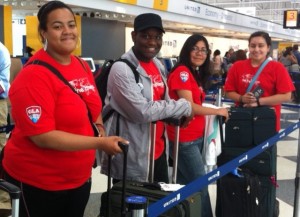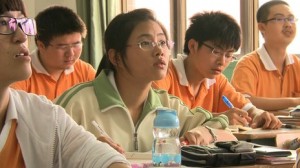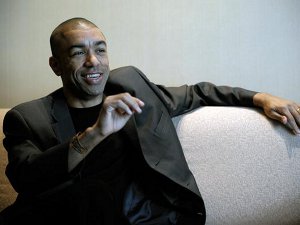One of the initial motivations for this blog was the limited amount of information available highlighting any bridges between the African American and Chinese community. Cultural heritage is very important for my family. It is an ongoing goal of mine to strengthen my daughter’s knowledge of our African ancestry while also supporting their academic journey into the Chinese culture.
I find that the celebration of Ancestors Day is one of those bridges between the Chinese and Black communities. As my own family is transitioning into an inter-generational household I have found an additional bond with many Chinese parents. We met a mother in New York who was born in China and relocated to New York to live with her in-laws. In American culture we often say that we relocate to “support” our elderly parents but she highlighted that this is not what they should do instead this is “the least” that they could do.
Ancestors Day occurred at the beginning of the month (April 4th) but I still wanted to highlight in today’s post because it is a celebration that I know is shared by both communities.
Ancestors Day
The Qingming Festival, Clear Bright Festival, Ancestors Day or Tomb Sweeping Day is a traditional Chinese festival on the 104th day after the winter solstice (or the 15th day from the Spring Equinox), usually occurring around April 5 of the Gregorian calendar (see Chinese calendar). Astronomically it is also a solar term (See Qingming). The Qingming festival falls on the first day of the fifth solar term, named Qingming. Its name denotes a time for people to go outside and enjoy the greenery of springtime and tend to the graves of departed ones.
Qingming has been regularly observed as a statutory public holiday in Taiwan and in the Chinese jurisdictions of Hong Kong and Macau. Its observance was reinstated as a public holiday in mainland China in 2008, after having been previously suppressed by the ruling Communist Party in 1949.
Origin
 Qinming Festival originated from Hanshi Day ( literally, Day with cold food only), a memorial day for Jie Zitui. Jie Zitui died in 636 BC in the Spring and Autumn Period. He was one of many followers of Duke Wen of Jin before he became a Duke. One time, during Wens 19 years of exile, they didnt have any food and Jie prepared some meat soup for Wen. Wen enjoyed it a lot and wondered where Jie got the soup. It turned out Jie had cut a piece of meat from his own thigh to make the soup. Wen was so moved he promised to reward him one day. However, Jie was not the type of person who sought rewards. Instead, he just wanted to help Wen to return to Jin to become Duke. Once Wen became Duke, Jie resigned and stayed away from the Duke. Duke Wen rewarded the people who helped him in the decades, but for some reason he forgot to reward Jie, who by then had moved into the forest with his mother. Duke Wen went to the forest, but couldnt find Jie. Heeding suggestions from his officials, Duke Wen ordered men to set the forest on fire to force out Jie, however, Jie died in the fire. Feeling remorseful, Duke Wen ordered three days without fire to honour Jies memory. The county where Jie died is still called Jiexiu .
Qinming Festival originated from Hanshi Day ( literally, Day with cold food only), a memorial day for Jie Zitui. Jie Zitui died in 636 BC in the Spring and Autumn Period. He was one of many followers of Duke Wen of Jin before he became a Duke. One time, during Wens 19 years of exile, they didnt have any food and Jie prepared some meat soup for Wen. Wen enjoyed it a lot and wondered where Jie got the soup. It turned out Jie had cut a piece of meat from his own thigh to make the soup. Wen was so moved he promised to reward him one day. However, Jie was not the type of person who sought rewards. Instead, he just wanted to help Wen to return to Jin to become Duke. Once Wen became Duke, Jie resigned and stayed away from the Duke. Duke Wen rewarded the people who helped him in the decades, but for some reason he forgot to reward Jie, who by then had moved into the forest with his mother. Duke Wen went to the forest, but couldnt find Jie. Heeding suggestions from his officials, Duke Wen ordered men to set the forest on fire to force out Jie, however, Jie died in the fire. Feeling remorseful, Duke Wen ordered three days without fire to honour Jies memory. The county where Jie died is still called Jiexiu .
Qingming has a tradition stretching back more than 2,500 years. Its origin is credited to the Tang Emperor Xuanzong in 732. Wealthy citizens in China were reportedly holding too many extravagant and ostentatiously expensive ceremonies in honour of their ancestors. Emperor Xuanzong, seeking to curb this practice, declared that respects could be formally paid at ancestors graves only on Qingming. The observance of Qingming found a firm place in Chinese culture and continued uninterrupted for over two millennia. In 1949 the Communist Party of China repealed the holiday. Observance of Qingming remained suppressed until 2008, when the Party reinstated the holiday.
Celebration
 The Qingming Festival is an opportunity for celebrants to remember and honour their ancestors at grave sites. Young and old pray before the ancestors, sweep the tombs and offer food, tea, wine, chopsticks, joss paper accessories, and/or libation to the ancestors. The rites have a long tradition in Asia, especially among farmers. Some people carry willow branches with them on Qingming, or put willow branches on their gates and/or front doors. They believe that willow branches help ward off the evil spirit that wanders on Qingming. Also on Qingming people go on family outings, start the spring plowing, sing, dance, and Qingming is a time where young couples start courting. Another popular thing to do is fly kites (in shapes of animals or characters from Chinese opera). Others carry flowers instead of burning paper, incense or firecrackers as is common.
The Qingming Festival is an opportunity for celebrants to remember and honour their ancestors at grave sites. Young and old pray before the ancestors, sweep the tombs and offer food, tea, wine, chopsticks, joss paper accessories, and/or libation to the ancestors. The rites have a long tradition in Asia, especially among farmers. Some people carry willow branches with them on Qingming, or put willow branches on their gates and/or front doors. They believe that willow branches help ward off the evil spirit that wanders on Qingming. Also on Qingming people go on family outings, start the spring plowing, sing, dance, and Qingming is a time where young couples start courting. Another popular thing to do is fly kites (in shapes of animals or characters from Chinese opera). Others carry flowers instead of burning paper, incense or firecrackers as is common.
 The holiday is often marked by people paying respects to those who died in events considered sensitive in China. The April Fifth Movement and the Tiananmen Incident were major events on Qingming that took place in the history of the Peoples Republic of China. When Premier Zhou Enlai died in 1976, thousands visited him during the festival to pay their respects. Many also pay respects to victims of the Tiananmen Square protests in 1989 and the graves of Zhao Ziyang and Yang Jia in areas where rights of free expression are generally recognized, as in Hong Kong; in most areas of China such observances are suppressed and all public mention of such subjects is taboo. In Taiwan the national holiday is observed on April 5 because the ruling Kuomintang moved it to that date in commemoration of the death of Chiang Kai-shek on April 5. The holiday is nevertheless observed in the traditional manner, with families gathering to honour their own ancestors, visit and maintain their family shrines, and share traditional meals.
The holiday is often marked by people paying respects to those who died in events considered sensitive in China. The April Fifth Movement and the Tiananmen Incident were major events on Qingming that took place in the history of the Peoples Republic of China. When Premier Zhou Enlai died in 1976, thousands visited him during the festival to pay their respects. Many also pay respects to victims of the Tiananmen Square protests in 1989 and the graves of Zhao Ziyang and Yang Jia in areas where rights of free expression are generally recognized, as in Hong Kong; in most areas of China such observances are suppressed and all public mention of such subjects is taboo. In Taiwan the national holiday is observed on April 5 because the ruling Kuomintang moved it to that date in commemoration of the death of Chiang Kai-shek on April 5. The holiday is nevertheless observed in the traditional manner, with families gathering to honour their own ancestors, visit and maintain their family shrines, and share traditional meals.
 Despite having no holiday status, the overseas Chinese communities in Southeast Asian nations such as those in Singapore and Malaysia take this festival seriously; deep in heritage, rituals and strict decorum. Qing Ming in Malaysia is an elaborate family function or a clan feast (usually organized by the respective clan association) to commemorate and honour their late relations at grave site and their distant ancestry of China at home altar, clan temple or a makeshift altar in a Buddhist or Taoist temple. For the oversea community, Qing ming festival is very much a family heritage and at the same, a family obligation. The overseas Chinese see this festival as a time to reflect, honour and give thanks to their forefathers. The oversea Chinese normally visit the graves of their late relations at the nearest weekend of the actual date. According to the ancient custom, grave site veneration is only feasible 10 days before and after Qingming Festival. If the visit is not on the actual date normally veneration before Qingming is encouraged. Qingming Festival in Malaysia and Singapore normally started early in the morning, with the ancestral veneration at home altar- paying respect to the distant ancestors from China. This would be followed by visiting the graves of their close relations in the country. Some would take the extent of filial piety to visit the graves of their ancestors in mainland China. Traditionally, family will burn paper money (paper have imprint of money) and paper replica of some material good such car, maid, home, phone, and etc. In Chinese culture, even though a person died, he/she may still need all of these in the afterlife. There should always an even number of dishes put in front of the grave and a bowl of rice with incense stick upright. Then, family members start taking turn to bow before the tomb of the ancestors. Bowing will go in order, which starts with the most senior member of the family and so on. After the ancestor worship at the grave site, the whole family or the whole clan would be feasting the food and drinks they brought for the worship at the site or nearby gardens in the memorial park, signifying family reunion with the ancestors.
Despite having no holiday status, the overseas Chinese communities in Southeast Asian nations such as those in Singapore and Malaysia take this festival seriously; deep in heritage, rituals and strict decorum. Qing Ming in Malaysia is an elaborate family function or a clan feast (usually organized by the respective clan association) to commemorate and honour their late relations at grave site and their distant ancestry of China at home altar, clan temple or a makeshift altar in a Buddhist or Taoist temple. For the oversea community, Qing ming festival is very much a family heritage and at the same, a family obligation. The overseas Chinese see this festival as a time to reflect, honour and give thanks to their forefathers. The oversea Chinese normally visit the graves of their late relations at the nearest weekend of the actual date. According to the ancient custom, grave site veneration is only feasible 10 days before and after Qingming Festival. If the visit is not on the actual date normally veneration before Qingming is encouraged. Qingming Festival in Malaysia and Singapore normally started early in the morning, with the ancestral veneration at home altar- paying respect to the distant ancestors from China. This would be followed by visiting the graves of their close relations in the country. Some would take the extent of filial piety to visit the graves of their ancestors in mainland China. Traditionally, family will burn paper money (paper have imprint of money) and paper replica of some material good such car, maid, home, phone, and etc. In Chinese culture, even though a person died, he/she may still need all of these in the afterlife. There should always an even number of dishes put in front of the grave and a bowl of rice with incense stick upright. Then, family members start taking turn to bow before the tomb of the ancestors. Bowing will go in order, which starts with the most senior member of the family and so on. After the ancestor worship at the grave site, the whole family or the whole clan would be feasting the food and drinks they brought for the worship at the site or nearby gardens in the memorial park, signifying family reunion with the ancestors.
Hanshi, the day before Qingming, was created by Chonger, the Duke Wen of the state of Jin during the Spring and Autumn Period. The festival was established after Chonger accidentally burned to death his personal friend and servant Jie Zhitui (or Jie Zitui) and Jie Zituis mother. Chonger ordered the hills they were hiding in set on fire in hopes that Jie Zitui would return to his service, but the fire killed Jie and his mother. On Hanshi, people were not allowed to use fires to heat up food, thus nicknaming it the Cold Food Festival. Eventually, 300 years ago, the Hanshi “celebration” was combined with the Qingming festival, but later abandoned by most people.
http://en.wikipedia.org/wiki/Qingming_Festival






 Qinming Festival originated from Hanshi Day ( literally, Day with cold food only), a memorial day for Jie Zitui. Jie Zitui died in 636 BC in the Spring and Autumn Period. He was one of many followers of Duke Wen of Jin before he became a Duke. One time, during Wens 19 years of exile, they didnt have any food and Jie prepared some meat soup for Wen. Wen enjoyed it a lot and wondered where Jie got the soup. It turned out Jie had cut a piece of meat from his own thigh to make the soup. Wen was so moved he promised to reward him one day. However, Jie was not the type of person who sought rewards. Instead, he just wanted to help Wen to return to Jin to become Duke. Once Wen became Duke, Jie resigned and stayed away from the Duke. Duke Wen rewarded the people who helped him in the decades, but for some reason he forgot to reward Jie, who by then had moved into the forest with his mother. Duke Wen went to the forest, but couldnt find Jie. Heeding suggestions from his officials, Duke Wen ordered men to set the forest on fire to force out Jie, however, Jie died in the fire. Feeling remorseful, Duke Wen ordered three days without fire to honour Jies memory. The county where Jie died is still called Jiexiu .
Qinming Festival originated from Hanshi Day ( literally, Day with cold food only), a memorial day for Jie Zitui. Jie Zitui died in 636 BC in the Spring and Autumn Period. He was one of many followers of Duke Wen of Jin before he became a Duke. One time, during Wens 19 years of exile, they didnt have any food and Jie prepared some meat soup for Wen. Wen enjoyed it a lot and wondered where Jie got the soup. It turned out Jie had cut a piece of meat from his own thigh to make the soup. Wen was so moved he promised to reward him one day. However, Jie was not the type of person who sought rewards. Instead, he just wanted to help Wen to return to Jin to become Duke. Once Wen became Duke, Jie resigned and stayed away from the Duke. Duke Wen rewarded the people who helped him in the decades, but for some reason he forgot to reward Jie, who by then had moved into the forest with his mother. Duke Wen went to the forest, but couldnt find Jie. Heeding suggestions from his officials, Duke Wen ordered men to set the forest on fire to force out Jie, however, Jie died in the fire. Feeling remorseful, Duke Wen ordered three days without fire to honour Jies memory. The county where Jie died is still called Jiexiu . The Qingming Festival is an opportunity for celebrants to remember and honour their ancestors at grave sites. Young and old pray before the ancestors, sweep the tombs and offer food, tea, wine, chopsticks, joss paper accessories, and/or libation to the ancestors. The rites have a long tradition in Asia, especially among farmers. Some people carry willow branches with them on Qingming, or put willow branches on their gates and/or front doors. They believe that willow branches help ward off the evil spirit that wanders on Qingming. Also on Qingming people go on family outings, start the spring plowing, sing, dance, and Qingming is a time where young couples start courting. Another popular thing to do is fly kites (in shapes of animals or characters from Chinese opera). Others carry flowers instead of burning paper, incense or firecrackers as is common.
The Qingming Festival is an opportunity for celebrants to remember and honour their ancestors at grave sites. Young and old pray before the ancestors, sweep the tombs and offer food, tea, wine, chopsticks, joss paper accessories, and/or libation to the ancestors. The rites have a long tradition in Asia, especially among farmers. Some people carry willow branches with them on Qingming, or put willow branches on their gates and/or front doors. They believe that willow branches help ward off the evil spirit that wanders on Qingming. Also on Qingming people go on family outings, start the spring plowing, sing, dance, and Qingming is a time where young couples start courting. Another popular thing to do is fly kites (in shapes of animals or characters from Chinese opera). Others carry flowers instead of burning paper, incense or firecrackers as is common. The holiday is often marked by people paying respects to those who died in events considered sensitive in China. The April Fifth Movement and the Tiananmen Incident were major events on Qingming that took place in the history of the Peoples Republic of China. When Premier Zhou Enlai died in 1976, thousands visited him during the festival to pay their respects. Many also pay respects to victims of the Tiananmen Square protests in 1989 and the graves of Zhao Ziyang and Yang Jia in areas where rights of free expression are generally recognized, as in Hong Kong; in most areas of China such observances are suppressed and all public mention of such subjects is taboo. In Taiwan the national holiday is observed on April 5 because the ruling Kuomintang moved it to that date in commemoration of the death of Chiang Kai-shek on April 5. The holiday is nevertheless observed in the traditional manner, with families gathering to honour their own ancestors, visit and maintain their family shrines, and share traditional meals.
The holiday is often marked by people paying respects to those who died in events considered sensitive in China. The April Fifth Movement and the Tiananmen Incident were major events on Qingming that took place in the history of the Peoples Republic of China. When Premier Zhou Enlai died in 1976, thousands visited him during the festival to pay their respects. Many also pay respects to victims of the Tiananmen Square protests in 1989 and the graves of Zhao Ziyang and Yang Jia in areas where rights of free expression are generally recognized, as in Hong Kong; in most areas of China such observances are suppressed and all public mention of such subjects is taboo. In Taiwan the national holiday is observed on April 5 because the ruling Kuomintang moved it to that date in commemoration of the death of Chiang Kai-shek on April 5. The holiday is nevertheless observed in the traditional manner, with families gathering to honour their own ancestors, visit and maintain their family shrines, and share traditional meals. Despite having no holiday status, the overseas Chinese communities in Southeast Asian nations such as those in Singapore and Malaysia take this festival seriously; deep in heritage, rituals and strict decorum. Qing Ming in Malaysia is an elaborate family function or a clan feast (usually organized by the respective clan association) to commemorate and honour their late relations at grave site and their distant ancestry of China at home altar, clan temple or a makeshift altar in a Buddhist or Taoist temple. For the oversea community, Qing ming festival is very much a family heritage and at the same, a family obligation. The overseas Chinese see this festival as a time to reflect, honour and give thanks to their forefathers. The oversea Chinese normally visit the graves of their late relations at the nearest weekend of the actual date. According to the ancient custom, grave site veneration is only feasible 10 days before and after Qingming Festival. If the visit is not on the actual date normally veneration before Qingming is encouraged. Qingming Festival in Malaysia and Singapore normally started early in the morning, with the ancestral veneration at home altar- paying respect to the distant ancestors from China. This would be followed by visiting the graves of their close relations in the country. Some would take the extent of filial piety to visit the graves of their ancestors in mainland China. Traditionally, family will burn paper money (paper have imprint of money) and paper replica of some material good such car, maid, home, phone, and etc. In Chinese culture, even though a person died, he/she may still need all of these in the afterlife. There should always an even number of dishes put in front of the grave and a bowl of rice with incense stick upright. Then, family members start taking turn to bow before the tomb of the ancestors. Bowing will go in order, which starts with the most senior member of the family and so on. After the ancestor worship at the grave site, the whole family or the whole clan would be feasting the food and drinks they brought for the worship at the site or nearby gardens in the memorial park, signifying family reunion with the ancestors.
Despite having no holiday status, the overseas Chinese communities in Southeast Asian nations such as those in Singapore and Malaysia take this festival seriously; deep in heritage, rituals and strict decorum. Qing Ming in Malaysia is an elaborate family function or a clan feast (usually organized by the respective clan association) to commemorate and honour their late relations at grave site and their distant ancestry of China at home altar, clan temple or a makeshift altar in a Buddhist or Taoist temple. For the oversea community, Qing ming festival is very much a family heritage and at the same, a family obligation. The overseas Chinese see this festival as a time to reflect, honour and give thanks to their forefathers. The oversea Chinese normally visit the graves of their late relations at the nearest weekend of the actual date. According to the ancient custom, grave site veneration is only feasible 10 days before and after Qingming Festival. If the visit is not on the actual date normally veneration before Qingming is encouraged. Qingming Festival in Malaysia and Singapore normally started early in the morning, with the ancestral veneration at home altar- paying respect to the distant ancestors from China. This would be followed by visiting the graves of their close relations in the country. Some would take the extent of filial piety to visit the graves of their ancestors in mainland China. Traditionally, family will burn paper money (paper have imprint of money) and paper replica of some material good such car, maid, home, phone, and etc. In Chinese culture, even though a person died, he/she may still need all of these in the afterlife. There should always an even number of dishes put in front of the grave and a bowl of rice with incense stick upright. Then, family members start taking turn to bow before the tomb of the ancestors. Bowing will go in order, which starts with the most senior member of the family and so on. After the ancestor worship at the grave site, the whole family or the whole clan would be feasting the food and drinks they brought for the worship at the site or nearby gardens in the memorial park, signifying family reunion with the ancestors.

